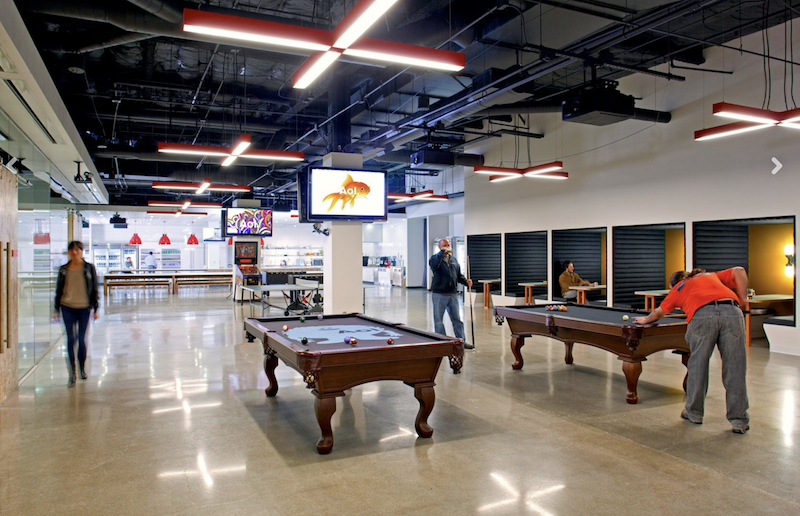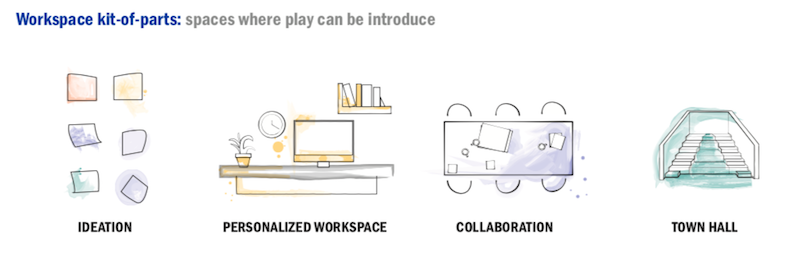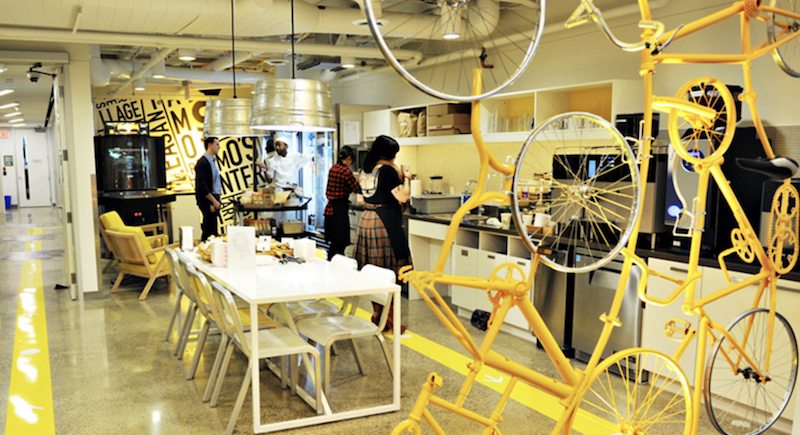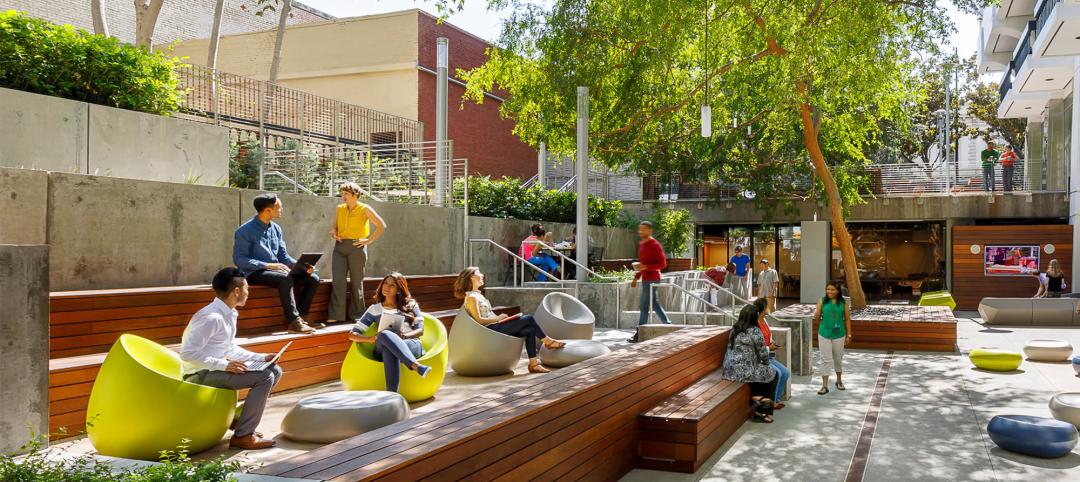Perkins Eastman has released a highly annotated study that suggests that employees are more likely to be open to discovery when their workplaces are infused with a state of play, which the study’s authors define as engaging in activities for the pure enjoyment of the process.
“The right kind of play has an essential role in producing innovation,” the authors state. They elaborate that a sense of being removed from external pressures “leaves us open to different perspectives and experiences.” The authors also see play as an effective social connector, “helping to form trusting relationships or to open up lines of communication.”
The study cites numerous books and papers that examine this topic. One of its touchstone is the Hungarian-American psychologist Mihaly Csikszentmihalyi’s book Creativity: Flow and the Psychology of Discovery and Invention, which provides examples of innovations in art and science that burbled to the surface as a result of specifically not focusing on work. Ransom Stephens, the author of A Look at the Neuroscience of Innovation & Creativity in Art, Science & Life, calls this phenomenon “defocusing into insight.”
This “Google-ization” of the office, where play and work mingle, only leads to discovery, says Perkins Eastman, when play is “serious.” Its study quotes Bruce Nussbaum, a professor of design at Parsons The New School of Design, who wrote: “In serious play there are rules, there is competition, there are winners and losers. Above all, there is learning, the kind of learning that allows you to navigate unknown areas, make unusual connections, and achieve new goals in unforeseen ways.”

AOL was an early adopter of the concept of playful workplaces. When it relocated to its 80,000-sf headquarters Palo Alto, Calif., in 2011, it hired Studio A+O, to refresh and create a more relaxed office environment. Image: Jasper Sanidad/AOL
The study offers several instances where the built environment has increased creative output. It singles out IDEO, the global design and innovation consultant, whose longtime partner Tom Kelley credits his company’s success to a culture of playfulness and collaboration.
IDEO’s offices don’t feel like typical office spaces, Perkins Eastman notes: “Wide-open floor plans provide a flexible backdrop for communal tables and various types of meeting areas. Displays of Post-it-covered walls, outlandish prototyping experiments, and bicycles suspended from the ceiling send the collective message to employees that here, anything goes.”
Kelley describes each IDEO office as a collection of “neighborhoods,” where people are grouped together on a project-by-project basis, as opposed to their skill set or expertise.
To inform its suggested design solutions, Perkins Eastman turns to a recent paper, “Elements of a Successful Playspace: Enhancing Physical, Cognitive and Social Experience,” written by the nonprofit Project for Public Spaces, which considers three overarching concepts for a successful play environment: physical, social, and cognitive.

Perkins Eastman sees plenty of opportunities where play can be a part of the workplace. Image: Perkins Eastman
For companies that want to promote creativity and innovation through play, Perkins Eastman recommends:
Personalization — Giving employees the freedom to personalize their workspaces can be an effective strategy.
Access + Linkages — Collaboration can increase the
rate at which new ideas are generated and played out—an important competitive advantage when it comes to innovation. Bringing people together can raise the level of enthusiasm surrounding new ideas, as well as increase the chances of follow-through.
Variety + Choice — It notes that IDEO’s Kelley emphasizes that hierarchy is the enemy of playful and productive work environments. A company culture that communicates that everyone’s ideas are important is a fertile environment for innovation. It is for this reason that IDEO has strived from its beginning to maintain a flattened corporate structure. IDEO employees are categorized by four “levels of impact” based on their skills and responsibilities.
Related Stories
Adaptive Reuse | Mar 30, 2024
Hotel vs. office: Different challenges in commercial to residential conversions
In the midst of a national housing shortage, developers are examining the viability of commercial to residential conversions as a solution to both problems.
Sustainability | Mar 29, 2024
Demystifying carbon offsets vs direct reductions
Chris Forney, Principal, Brightworks Sustainability, and Rob Atkinson, Senior Project Manager, IA Interior Architects, share the misconceptions about carbon offsets and identify opportunities for realizing a carbon-neutral building portfolio.
Office Buildings | Mar 28, 2024
Workplace campus design philosophy: People are the new amenity
Nick Arambarri, AIA, LEED AP BD+C, NCARB, Director of Commercial, LPA, underscores the value of providing rich, human-focused environments for the return-to-office workforce.
Office Buildings | Mar 27, 2024
A new Singapore office campus inaugurates the Jurong Innovation District, a business park located in a tropical rainforest
Surbana Jurong, an urban, infrastructure and managed services consulting firm, recently opened its new headquarters in Singapore. Surbana Jurong Campus inaugurates the Jurong Innovation District, a business park set in a tropical rainforest.
Adaptive Reuse | Mar 26, 2024
Adaptive Reuse Scorecard released to help developers assess project viability
Lamar Johnson Collaborative announced the debut of the firm’s Adaptive Reuse Scorecard, a proprietary methodology to quickly analyze the viability of converting buildings to other uses.
Sustainability | Mar 21, 2024
World’s first TRUE-certified building project completed in California
GENESIS Marina, an expansive laboratory and office campus in Brisbane, Calif., is the world’s first Total Resource Use and Efficiency (TRUE)-certified construction endeavor. The certification recognizes projects that achieve outstanding levels of resource efficiency through waste reduction, reuse, and recycling practices.
Office Buildings | Mar 21, 2024
Corporate carbon reduction pledges will have big impact on office market
Corporate carbon reduction commitments will have a significant impact on office leasing over the next few years. Businesses that have pledged to reduce their organization’s impact on climate change must ensure their next lease allows them to show material progress on their goals, according to a report by JLL.
Adaptive Reuse | Mar 21, 2024
Massachusetts launches program to spur office-to-residential conversions statewide
Massachusetts Gov. Maura Healey recently launched a program to help cities across the state identify underused office buildings that are best suited for residential conversions.
Office Buildings | Mar 21, 2024
BOMA updates floor measurement standard for office buildings
The Building Owners and Managers Association (BOMA) International has released its latest floor measurement standard for office buildings, BOMA 2024 for Office Buildings – ANSI/BOMA Z65.1-2024.
Sustainability | Mar 13, 2024
Trends to watch shaping the future of ESG
Gensler’s Climate Action & Sustainability Services Leaders Anthony Brower, Juliette Morgan, and Kirsten Ritchie discuss trends shaping the future of environmental, social, and governance (ESG).

















